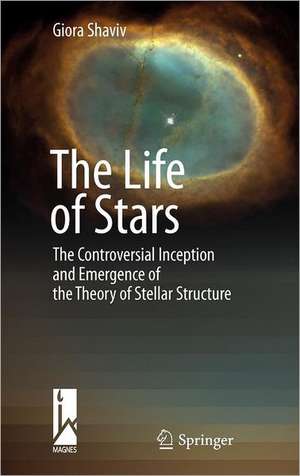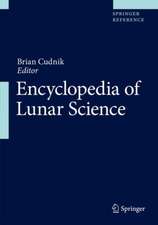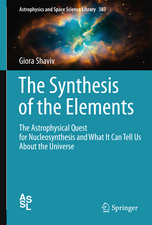The Life of Stars: The Controversial Inception and Emergence of the Theory of Stellar Structure
Autor Giora Shaviven Limba Engleză Hardback – noi 2009
| Toate formatele și edițiile | Preț | Express |
|---|---|---|
| Paperback (1) | 651.34 lei 6-8 săpt. | |
| Springer Berlin, Heidelberg – 3 noi 2014 | 651.34 lei 6-8 săpt. | |
| Hardback (1) | 656.43 lei 6-8 săpt. | |
| Springer Berlin, Heidelberg – noi 2009 | 656.43 lei 6-8 săpt. |
Preț: 656.43 lei
Preț vechi: 772.26 lei
-15% Nou
Puncte Express: 985
Preț estimativ în valută:
125.60€ • 131.50$ • 103.93£
125.60€ • 131.50$ • 103.93£
Carte tipărită la comandă
Livrare economică 05-19 aprilie
Preluare comenzi: 021 569.72.76
Specificații
ISBN-13: 9783642020872
ISBN-10: 3642020879
Pagini: 520
Ilustrații: XIV, 504 p.
Dimensiuni: 155 x 235 x 36 mm
Greutate: 0.86 kg
Ediția:2010
Editura: Springer Berlin, Heidelberg
Colecția Springer
Locul publicării:Berlin, Heidelberg, Germany
ISBN-10: 3642020879
Pagini: 520
Ilustrații: XIV, 504 p.
Dimensiuni: 155 x 235 x 36 mm
Greutate: 0.86 kg
Ediția:2010
Editura: Springer Berlin, Heidelberg
Colecția Springer
Locul publicării:Berlin, Heidelberg, Germany
Public țintă
Professional/practitionerDescriere
It is the stars, The stars above us, govern our conditions. William Shakespeare, King Lear A Few Words about What, Why and How The structure of the stars in general, and the Sun in particular, has been the subject of extensivescienti?cresearchanddebateforoveracentury.Thediscoveryofquantum theoryduringthe?rsthalfofthenineteenthcenturyprovidedmuchofthetheoretical background needed to understand the making of the stars and how they live off their energysource. Progress in the theoryof stellar structurewasmade through extensive discussions and controversies between the giants of the ?elds, as well as brilliant discoveries by astronomers. In this book, we shall carefully expose the building of the theory of stellar structure and evolution, and explain how our understanding of the stars has emerged from this background of incessant debate. About hundred years were required for astrophysics to answer the crucial ques tions: What is the energy source of the stars? How are the stars made? How do they evolve and eventually die? The answers to these questions have profound im plications for astrophysics, physics, and biology, and the question of how we our selves come to be here. While we already possess many of the answers, the theory of stellar structure is far from being complete, and there are many open questions, for example, concerning the mechanisms which trigger giant supernova explosions. Many internal hydrodynamic processes remain a mystery. Yet some global pictures can indeed be outlined, and this is what we shall attempt to do here.
Cuprins
The Controversy about the Age of the Earth.- What Stellar Classification Tells Us.- The Dawn of a New Era.- Towards a Complete Theory of Stellar Structure.- From Chemistry to Dying Stars.- The Solution to the Stellar Energy Problem.- How the Low Mass Stars Perish.- The Life and Death of Massive Stars.- The Sun.
Recenzii
From the reviews:
“The story of stellar structure is interwoven with the development of quantum mechanics and the determination that nuclear fusion reactions produce the energy emitted by stars. The author provides excellent coverage of those two developments. He also effectively notes that stellar theorists often had access, in principle, to information that would have allowed them to take giant leaps toward a solution.” (Robert Deupree, Physics Today, November, 2010)
“For historians of science, Shaviv has done a considerable service by searching out many obscure or forgotten papers amongst the important and well-known ones, and he does give references to almost everything. He adds quite extensive footnotes as well.” (Robert Connon Smith, The Observatory, Vol. 131 (1220), February, 2011)
“I thoroughly enjoyed this book. … it especially enjoyable for me were the tiny snippets or anecdotes which appear quite liberally throughout the book, sometimes in the main text but more usually as a footnote. … The author, Giora Shaviv, is a leading theoretical astrophysicist. … The writing style is easy and the book is exceedingly well referenced.” (Roger Pickard, Journal of the British Astronomical Association, Vol. 120 (5), 2010)
“The story of stellar structure is interwoven with the development of quantum mechanics and the determination that nuclear fusion reactions produce the energy emitted by stars. The author provides excellent coverage of those two developments. He also effectively notes that stellar theorists often had access, in principle, to information that would have allowed them to take giant leaps toward a solution.” (Robert Deupree, Physics Today, November, 2010)
“For historians of science, Shaviv has done a considerable service by searching out many obscure or forgotten papers amongst the important and well-known ones, and he does give references to almost everything. He adds quite extensive footnotes as well.” (Robert Connon Smith, The Observatory, Vol. 131 (1220), February, 2011)
“I thoroughly enjoyed this book. … it especially enjoyable for me were the tiny snippets or anecdotes which appear quite liberally throughout the book, sometimes in the main text but more usually as a footnote. … The author, Giora Shaviv, is a leading theoretical astrophysicist. … The writing style is easy and the book is exceedingly well referenced.” (Roger Pickard, Journal of the British Astronomical Association, Vol. 120 (5), 2010)
Notă biografică
Giora Shaviv started astrophysics in Israel (Tel Aviv University and the Technion – Israel Institute of Technology) after spending several years in Caltech and Cornell in the USA. Shaviv conceived, designed and launched the Technion student and faculty research satellite.
Shaviv is a leading theoretical astrophysicists. He has published numerous articles in professional journals on stellar physics, galaxies and astrophysical fluids. He has to his credit many contributions to stellar physics. Recently, the Physical Review Letters selected one of his papers among the best 20 papers published in the past 50 years in this journal.
He initiated the Asher Space Research institute at the Technion and also served as President of the Israeli Physical Society.
Shaviv is a leading theoretical astrophysicists. He has published numerous articles in professional journals on stellar physics, galaxies and astrophysical fluids. He has to his credit many contributions to stellar physics. Recently, the Physical Review Letters selected one of his papers among the best 20 papers published in the past 50 years in this journal.
He initiated the Asher Space Research institute at the Technion and also served as President of the Israeli Physical Society.
Textul de pe ultima copertă
This beautifully illustrated book describes the birth and evolution of the theory of stellar structure through the vehement controversy between biology (as presented by Darwin) and physics (as presented by Kelvin) about the age of the Earth, which culminated with Rutherford suggesting radioactive dating. Shaviv analyzes critically many proclaimed scientific results, showing how and why they were wrong, and explains why it took decades to find the now accepted scientific answers - where there are such - and why there remains much more to be done before we can say we fully understand what happens up there in the heavens.
The Life of the Stars provides fascinating reading for all those interested in the stars, in the history of astronomy and in what their story tells us about how science progresses. Moreover, it will bring readers up-to-date on current problems in astrophysics.
The Life of the Stars provides fascinating reading for all those interested in the stars, in the history of astronomy and in what their story tells us about how science progresses. Moreover, it will bring readers up-to-date on current problems in astrophysics.
Caracteristici
Delivers fascinating insights into the development of the modern theory of stars
Attractively illustrated with clear diagrams and beautiful colour pictures
Illustrates with many examples of cultural expressions that the meaning we assign to unwanted events determines their perceived risk
Includes supplementary material: sn.pub/extras
Attractively illustrated with clear diagrams and beautiful colour pictures
Illustrates with many examples of cultural expressions that the meaning we assign to unwanted events determines their perceived risk
Includes supplementary material: sn.pub/extras





















